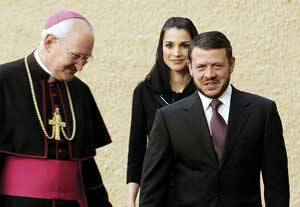The four-day papal visit to Jordan in May could spark a renewal of interreligious relations in that country and in the region, according to Muslim and Catholic analysts. “He’s coming after Sept. 11, after the American invasion of Iraq—so many things have changed” in the Middle East, said Farouq Jarar, a Muslim who is director of the Royal Aal al-Bayt Institute in Amman. “Understanding among Muslims and Christians is much more important now than at any time before. His visit will send a strong message to all Muslims, especially after the speech in Germany,” Jarar said, referring to the pope’s address in Regensburg in 2006, which sparked protests from Muslims around the world because of Benedict’s use of a quotation from a Byzantine emperor that many Muslims found offensive. The pope later clarified his remarks, insisting that he did not agree with the emperor’s words.
The upcoming visit “will give another side of the coin, and it will be a much better message for Muslims in general and for Arabs in particular,” Jarar said. “We think that when the pope understands the issues well, it is something great for humanity, because he’s a very influential man. Hopefully, he could be very effective in changing things for the better.”
Christians in the region expressed similar hopes. The visit “is considered a new horizon of collaboration between Muslims and Christians, not only in Jordan, but in all the world,” said the Rev. Rif’at Bader, who is managing media relations for the visit. “We are looking forward to his visit to the mosque in Jordan,” Father Bader said. On May 9 the pope will visit Jordan’s new King Hussein Mosque, which can accommodate 6,000 worshippers. “What will the pope do in these moments? I think he will pray to God, a silent prayer. A pope inside of a mosque—it is a sign of mutual respect...just to be there, without saying anything,” Father Bader added.
The pope also will give a formal speech outdoors, in front of the mosque. “We cannot predict what the pope will say, but we can imagine that he will talk about the dialogue between Muslims and Christians,” Father Bader said. Christians account for 3 percent of the Jordanian population, but have a disproportionately large cultural impact in Jordan, Father Bader said, adding, “We don’t focus on the numbers; we focus on the presence.”
Sister Caroline Shara, a Chaldean who is a member of the Daughters of the Sacred Heart, said the papal visit to Jordan “will be a time of great blessing for me.” A native of Baghdad, Iraq, Sister Shara has been in Amman for seven months serving Jordan’s Iraqi refugee population of between 500,000 and 750,000 people, according to United Nations estimates. Many refugees are asking her to obtain tickets for them for the papal Mass at Amman’s soccer stadium. “Even Muslims want to see the pope,” she said. “I wish, I hope, for the Holy Father to visit my country [Iraq], but it’s not a good time for a visit now,” Sister Shara said, explaining that many of the horrors she witnessed in Iraq are still vivid in her mind and continuing in the country. “The pope’s visit [to Jordan] will help to give me the strength and power to continue my walk with the Lord.”
Following his visit to Jordan, Pope Benedict will travel to Jerusalem on May 11. Jarar also expressed hope that the pope “will help in pushing the peace process toward achieving peace in the area and settling the conflict and availing all those concerned of their lawful, legitimate rights.”








